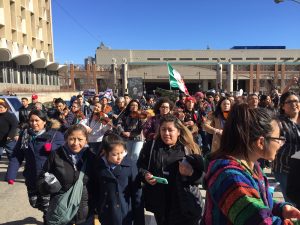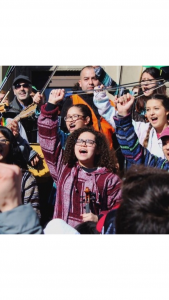To Proclaim Our Presence Known
 Un dia sin Latinos, A day without Latinos
Un dia sin Latinos, A day without Latinos
What does that mean? Did we all disappear? Did we suddenly vanish back to our home countries, leaving behind the remains of your unfinished lawn, gloves left on the ground of fields. The gloves imprinted with the bloodied hands of migrant workers picking the apples that you desire.
Nah, it’s a day. You’ll get your fruit or yard work done tomorrow.
But today is our day. In Milwaukee, Wisconsin, we step down from the sidewalks onto the paved roads, our bodies filling the hard concrete ground with our voices breaking the silence we have known too well. We march, despite the cold, despite the criticism we receive, despite the fact that it’s a Monday and we all have somewhere to be. But for today, classrooms are absent of young Latinx students, grocery stores are closed, and Cesar Chavez Street is eerily empty. Walking down the streets you can hear the faint remains of paleteros ringing their bells, simultaneously calling on the children of the south side towards the sweet, milky taste of paletas. Walking down the street you can smell the remains of fresh baked pan dulce, baked by the hard working women whose hands are calloused from pounding batter. Replacing the silence of Cesar Chavez St. a few blocks away at Walker’s square you are faced with the chants of the people. Brown faces, black faces, even some white faces are presente. Thousands line the street and right above their heads are hundred of signs. La poli, la migra, la misma porqueria; Stop Clarke, Stop 287g; Indict Convict Remove Sheriff Clarke; and so on.
It’s like a big family gathering because in the struggle we’re all family. Families are present with little Zapatistas sitting in their strollers and tiny Adelitas hanging onto their father’s jacket, their older siblings on the frontline. They have megaphones at hand, clenching onto the edge of banner stating their student organization, treating this march as if it were their last because to this country we are disposable.
I knew I was going to attend this march. How couldn’t I attend the Dia Sin Latinos march? I almost felt like it was my duty to stand on that chilly February Monday and let my voice be heard through the streets of Milwaukee. However, we Latinos love to plan things last minute so right around 6:00 p.m. the night before I got a text, the most typical type of texts you would get from Victor or Eli or frankly any of my friends.
“Yo, we’re all playing for the marcha tomorrow, meet by UCC at 9:00 a.m. Let’s all wear drug rugs.”
Drug rugs are the Mexican sweaters also known as baja sweaters, but does anyone really call them baja sweaters? They’re multicolored and are rough, coarse and just as uncomfortable to wear as they look. There is no other significance besides the fact that it seemed like everyone owned that sweater at that moment.
Now, mariachi runs in our Mexican blood. It is one of the first sound bites of music we hear and are often reminded of on birthdays and family celebrations. By blending Mozart’s dynamics and Moncayo’s complex styles we arrive at a challenging form of mariachi music we can relate to. Music is the sound of the resistance and what good are eleven years of decolonizing a white driven form of art if we can’t use it to your advantage. Classical music, as beautiful and intricate as it sounds, is occupied by the white community and my community encourages brown children to pursue such art forms. We consumed it and made it our own, and we brought it to this march to share with our family.
It was set, we would meet right by our community center at 9:00 (but really like 9:45 because you know damn well ain’t nobody gonna make it on time). So that’s where we stand, right under the bridge next to the preschool where we all grew up, a block away from where we attended grade school, middle school, and continued our after-school music lessons. Its Aztec-inspired towers break into the blue sky while on the surface murals circle its perimeter. Each panel breaks down a different Milwaukee landmark like the domes, the Basilica, while also depicting Aztec calendars, folklore dancers, and a graduating student. A passing sight to students but a real home to us, where we organized our own forms of art, learning new instruments, remixing traditional songs with the beats of congas, cajons, or jaranas. We use all the instruments at our disposal to create new music. Often using that tiny room as a safe space for creativity and family. But at this moment we stood under that bridge, wrapping ourselves in our drug rugs, clenching onto our violins, violas, guitarrones, and vihuelas. Mindlessly, we get into our semicircle formation.
Nostalgia fills the air battling with the cold. We start a couple easier, traditional songs. The tunes bring the older folks back to the lives they lead in their home countries, and younger ones are mesmerized and recognize the songs from one’s they were taught at home, filling the old and the new souls with memories and a connection to the past. About two blocks up you hear the chants of the people but where we stand families sing to Cielito Lindo and La Bamba. These are songs that we all grew up listening to. I smile because I am taken back to my first years of playing viola when I stayed up nights memorizing pieces, doing the fingerings in my sleep. While everyone sings, the front lines prepare themselves to start the march. We assumed positions in the midst of people. We squeezed into smaller spots, holding our instruments slightly above our heads to ensure that we wouldn’t bump into others or break them. Finally, slightly behind the younger, eager student organizations we find a spot. We form a straight line and began El Pijul. It is probably the most socially aware song we play. Its lyrics purely describe the immigrant’s struggle when traveling to the United States.
Que cruzando la frontera, que cruzando la frontera ya nos íbamos quedando
Si todos somos iguales, si todos somos iguales dime como te lo explico.
(When crossing the border, when crossing the border we were already staying
If we are all the same, if we are all the same, tell me how I can explain it to you.)
Not all of us have directly migrated from other countries and not all of our parents are undocumented, but La Raza Latinx considers itself family, and family stands up and fights back. Though some of us might have an advantage over others, we continuously fight for the justice others. This song, El Pijul grips onto the struggle immigrants face. At the start of the song, we hold our fists straight into the air singing the first verse. The obstacles are imagined through the fast pace, the intensity, and the emotion. I can’t even explain what Pijul even means. There isn’t a translation, and I guess that’s what adds to the many dimensions and complexity behind immigration. It is not a black and white matter, but is a gray matter, and amidst the gray are families and friends. A border is more than a physical object that divides but represents all the hurdles that we regularly have to cross in order to survive. We are walking past the faces of spectators, police, fellow marchers, though I have to watch my step because walking and playing the viola is no easy task. I feel empowered and liberated, others sing along and others cheer us on. We approach the white bridge that keeps the South Side and East Side segregated. Two different worlds in one city, one struck by poverty and crime while the other dominates itself in overpriced lofts and many coffee shops. Though my beloved South Side is considered “unsafe,” I, along with my South Side people appreciate what it has to offer. We appreciate the Mexican restaurants that line all major streets, the community centers that provide a space for creativity, and the murals that tell our past and highlight those who work hard in this community.
The fading murals done by artists generations past still hold onto a powerful message of activism. The one near First and Mitchell contains the faces of Martin Luther King and Emiliano Zapata while the mural right on First and Mitchell contains my own face within the depiction of UMOS (United Migrant Opportunity Services) and migrant workers in Milwaukee. As we walk though, we’re breaking a wall, that wall the divides us from those who are privileged. We are breaking the wall that considers us rapists and murderers. We’re marching, filling the cold, wispy air with our chants and music. There is no better feeling than yelling out such true words like “Trump escucha, estamos en la lucha.” These words release from my mouth just like many others, our breaths keeping us warm and our cracking voices holding on just enough to reach the courthouse.
Moments before reaching the courthouse, We somehow situate ourselves where all the women are in the front and the men stand on the sides. We are the machista’s worst nightmare. Machismo is aggressive masculine pride. It contaminates Latin American communities so when they see a group of powerful women taking over their spaces, they are scared shitless. I somehow am at the center of the group, leading it from a couple steps ahead. People recognize the familiar tune of La Bikina and cheer for us and follow us right to the courthouse. They open the space for us to cross and we lead the people right to where we will gather.
We reach the courthouse. Its large columns lining all sides of the building and a wide staircase leading right to the entrance. Its  intimidating presence stood nothing against the thousands who have come to stand on those steps, lawn, and street in order to proclaim our presence known. We string players thought we were done, that we would hear the speeches by community organizers, cheer, and head back home. However, Ms. D thought otherwise. It made sense. She usually throws these curveballs at us. She surprises us with performances with amazing artists and surprises us with longer rehearsals when we decide to not pay attention during practice. She is a force that cannot be stopped. She raised us musically and taught us that we are capable of takeover. She taught us that though we are continuously being silenced, our music cannot be. In few short words, she said “follow me” and walked us up the steps. I hold onto Karla’s sweater, holding onto the end of her drug rug with my left hand, and I hold my instrument over my head with my right hand. My bow is trying its best to not wave in the air. We make it to the top of the courthouse. I see students, families, workers, uncles, aunts, cousins, la familia is presente. I settle myself in the front row and we prepared El Pijul. We throw our fists in the airs and yell with all the power of our ancestors the first verse. Fists go up in the air in response to ours.
intimidating presence stood nothing against the thousands who have come to stand on those steps, lawn, and street in order to proclaim our presence known. We string players thought we were done, that we would hear the speeches by community organizers, cheer, and head back home. However, Ms. D thought otherwise. It made sense. She usually throws these curveballs at us. She surprises us with performances with amazing artists and surprises us with longer rehearsals when we decide to not pay attention during practice. She is a force that cannot be stopped. She raised us musically and taught us that we are capable of takeover. She taught us that though we are continuously being silenced, our music cannot be. In few short words, she said “follow me” and walked us up the steps. I hold onto Karla’s sweater, holding onto the end of her drug rug with my left hand, and I hold my instrument over my head with my right hand. My bow is trying its best to not wave in the air. We make it to the top of the courthouse. I see students, families, workers, uncles, aunts, cousins, la familia is presente. I settle myself in the front row and we prepared El Pijul. We throw our fists in the airs and yell with all the power of our ancestors the first verse. Fists go up in the air in response to ours.
Un dia sin Latinos, a day without Latinos. It spread throughout the media and was played on news stations for the rest of the night but who knows if the right people saw it. Those leaders who would return to their homes after their nine-to-five day, who would eat dinner with their families and not think of where their next meal would come from or even where their meal came from. Either way, when we walked back to our cars, back with our families, back to our second home there was a new sense of power and liberation. Momentarily, we did not fear Sheriff Clarke’s program, the potential of ICE raids, or what this next administration would bring us. We were free, free from fear and oppression. It was quiet in the streets after that. We clung onto this moment of power. We didn’t work that day, didn’t attend school, or purchase any goods. It was a day for the city to see how the it really needs Latinos.
Paula Lovo is an Interdisciplinary Documentary major at Columbia College Chicago. Born and raised in Milwaukee, Wisconsin, she comes from two immigrant parents. She grew up in a musical community learning to play the viola and jarana. Projects that have risen from this community include her involvement in the 2016 Grammy Nominated Album Buenaventura by La Santa Cecilia and performances with various music groups. Her focus in writing pertains to Latinx people and their lives.

